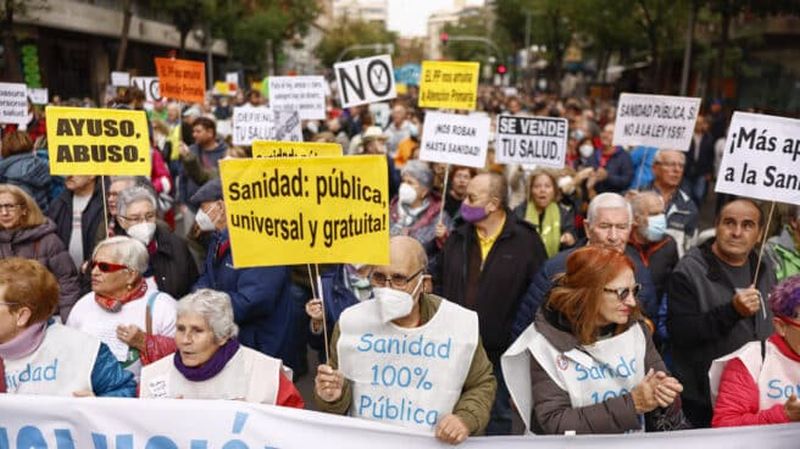
The health budgets of all the Autonomous Communities, recently approved for the new year, keep Primary Care underfunded. The care burden in Primary Care centers, the first level in defense of the health of the working class and popular sectors, has increased by 40% in many communities, as pointed out by the Spanish Society of Emergency and Emergency Medicine. (SEMES). Workers and workers have been suffering cuts since 2010, throughout the Spanish State only 47.2% of public health workers are permanent workers.
According to data from the Ministry of Health, in Primary Care, the level to which less spending is allocated, there are 0.77 doctors per 1,000 inhabitants and 0.66 nurses. Many health workers have to carry out the work of more than two people, with double shifts, without compliance with rest regimes and with alarming levels of exhaustion.
Despite the 7.7% increase in the budget of the autonomous communities in Health, below the level of inflation, public health continues to be in the bones. If in the European Union the average is a public investment of 2,244 euros per inhabitant, in the Spanish State it barely reaches 1,808 euros, with great inequality between regions, with Madrid being the autonomous community that invests the least, with 1,446.13 euros. Per inhabitant.
Also wage increases in the last year have been well below the increase in prices. The salary increase agreed by the majority unions in Catalonia has been 9.5% between 2022 and 2024 compared to an inflation of 11%. This increase for public employees does not correspond to the Consumer Price Index (CPI) and represents a loss of purchasing power in the face of inflation. Faced with this situation, the Medgets de Catalunya union has called a strike at all care levels and professional categories on January 25 and 26. The Federation of Organization of Public Services of the Intersindical, has also called a strike for all levels the next 24 and 25. From the union they affirm that “the conditions are precarious”.
In Madrid, Primary Care doctors also resume the strike that began on November 21 and which they suspended on December 22. They resume the fight before the zero progress of the negotiations of the AMYTS union with the Community of Madrid. Already in January a three-day strike took place on the 9th, 10th and 11th of this month in the extra-hospital emergencies. Extra-hospital emergency workers have been carrying out strikes since October 27, at which time Ayuso reorganized 80 centers to be attended with 40 staff. 26 of them do not have a doctor on staff. Several mobilizations of workers and users are also planned in this community in the coming weeks.
On the 17th and 18th of January the toilets of the Valencian Country go on strike. The Valencian Community-Medical Union (CESM CV) calls strikes at all levels of care. If the Ministry of Health does not reverse the post-pandemic deterioration in the service, they will go on strike again. The union affirms that in the face of the huge waiting lists they barely have three minutes to attend to each patient. There come to be schedules of 45-50 patients that are incompatible with providing quality care. Many of the hospital professionals work three shifts a month and work 70 hours a week. Overtime is paid well below double the normal hour.
In Andalusia there is a call for a strike of Primary Care personnel for January 27, called by the Andalusian Medical Union. The reasons are the same as in the rest of the State, aggravated by an Autonomous Community that is the fourth that invests the least in Health, waiting lines, schedules of more than 40 patients and the short time to attend to them is common.
In Extremadura, the SIMEX union calls strikes for January 26 and 27. They are fighting for the Extremadura Health Service to comply with the demands that were already signed in January 2019. On December 23 and 24, important strikes also took place in the Aragonese health system. For February 1, the Medical Union of Navarra has called an indefinite strike in Primary and Hospital Care.
The policies of the central government of the PSOE and Unidas Podemos and of the previous governments, together with the policies of the autonomous governments, are responsible for the total precariousness of public services, where temporality and outsourcing, against a quality service, they are common currency. It is also the responsibility of the bureaucracy that runs the majority unions, which is dedicated to operating as a containment dam and putting the union firm in constant cuts and attacks.
The coordination of all the fighting toilets is necessary to impose a total state strike of the public services in the Spanish State on the union leadership. Demand the immediate salary increase and equalization of all health workers and professional categories in accordance with the CPI, that demands an end to outsourcing, the transfer to permanent staff of all workers and the expropriation without payment of laboratories and private clinics, to integrate into the public health system under the control of its workers and users. Because our lives are worth more than their earnings.
Source: www.laizquierdadiario.com

